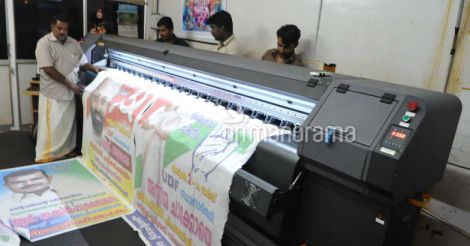Pathanamthitta: The state government will draw up a code of conduct on the use of polyvinyl chloride (PVC) flex banners that cause health hazards and environment pollution.
An expert panel appointed by the government has recommended that biodegradable and recyclable eco-friendly alternatives such as polyethylene and clothes should be promoted to restrict the use of PVC flex banners.
The National Green Tribunal has also initiated efforts to regulate the use of PVC and other forms of plastic in flexes and banners.
A hearing on the petitions against the proposed regulations was scheduled to be held in Thiruvananthapuram on May 8. However, a final decision would be taken after considering the grievances aired by people associated with the digital printing industry and flex suppliers who would get affected by the ban, officials said.
The plan is to impose a blanket ban on PVC flexes and plastic-coated cloth banners. The government would take the lead in discouraging the use of PVC flexes by political parties during elections and push for replacing non-biodegradable flex banners with ethylene or cloth banners. Labels certifying flexes as ‘recyclable and PVC free’ would be made mandatory. The name of the printing outlet and the registration number should also be displayed on each promotional material.
According to Dr M C Dathan, scientific adviser to the government, Kannur district administration has been setting an example by promoting the use flexes made of eco-friendly alternative materials.
The main villains in poly-vinyl chloride flex sheets are nylon, cadmium and lead. When these banners are burnt, toxic substances released will lead to environmental degradation and water contamination.
“The use of flex boards has come down drastically after the implementation of a green protocol at the administrative level. It was heartening to see the wide use of eco-friendly materials for election campaigns in some districts, especially in Kannur. While enforcing a ban, we must not forget that there are huge numbers of people associated with this industry. However, ultimately we have to find an eco-friendly sustainable solution to this issue,” said Suchitwa Mission executive director Dr R Ajayakumar Varma.
Panel’s key recommendations
• The ‘expiry date’ of banners with specific usage date will be the final day of the event for which they have been used. The time limit for advertisements put up by commercial establishments and others would be 90 days.
• While manufacturing banners, the printing number should be displayed and details of the client should be recorded and kept. Boards and posters should be removed by the clients within three days after the end date. Local bodies need to be empowered to collect penalties per square metre from defaulters.
• Printing outlets should take back boards and banners after use. In order to ensure that they are returned, a security deposit could be collected from the client. The amount needs to be refunded once the product is returned.
• Printing outlets should hand back used boards and flexes to the suppliers of raw materials in order to make sure that they are recycled. The permits of the establishments who fail to adhere to the rule would be cancelled.

























 Image for representation only. File
Image for representation only. File